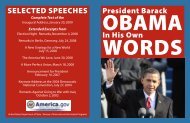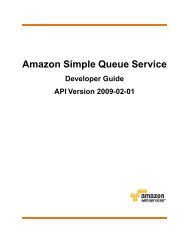obama
Create successful ePaper yourself
Turn your PDF publications into a flip-book with our unique Google optimized e-Paper software.
provide for one’s family, contributed to the erosion of black<br />
families — a problem that welfare policies for many years<br />
may have worsened. And the lack of basic services in so many<br />
urban black neighborhoods — parks for kids to play in, police<br />
walking the beat, regular garbage pick-up and building code<br />
enforcement - all helped create a cycle of violence, blight and<br />
neglect that continue to haunt us.<br />
…<br />
In fact, a similar anger exists within segments of the white<br />
community. Most working- and middle-class white Americans<br />
don’t feel that they have been particularly privileged by their<br />
race. Their experience is the immigrant experience - as far as<br />
they’re concerned, no one’s handed them anything, they’ve<br />
built it from scratch. They’ve worked hard all their lives, many<br />
times only to see their jobs shipped overseas or their pension<br />
dumped after a lifetime of labor. They are anxious about<br />
their futures, and feel their dreams slipping away; in an era of<br />
stagnant wages and global competition, opportunity comes<br />
to be seen as a zero sum game, in which your dreams come at<br />
my expense. So when they are told to bus their children to a<br />
school across town; when they hear that an African American<br />
is getting an advantage in landing a good job or a spot in a<br />
good college because of an injustice that they themselves<br />
never committed; when they’re told that their fears about<br />
crime in urban neighborhoods are somehow prejudiced,<br />
resentment builds over time.<br />
. . .<br />
68 69<br />
Just as black anger often proved counterproductive, so have<br />
these white resentments distracted attention from the real<br />
culprits of the middle class squeeze — a corporate culture<br />
rife with inside dealing, questionable accounting practices,<br />
and short-term greed; a Washington dominated by lobbyists<br />
and special interests; economic policies that favor the<br />
few over the many. And yet, to wish away the resentments<br />
of white Americans, to label them as misguided or even<br />
racist, without recognizing they are grounded in legitimate<br />
concerns — this too widens the racial divide, and blocks the<br />
path to understanding.<br />
This is where we are right now. It’s a racial stalemate we’ve<br />
been stuck in for years. Contrary to the claims of some of<br />
my critics, black and white, I have never been so naïve as to<br />
believe that we can get beyond our racial divisions in a single<br />
election cycle, or with a single candidacy — particularly a<br />
candidacy as imperfect as my own.<br />
But I have asserted a firm conviction — a conviction rooted<br />
in my faith in God and my faith in the American people—<br />
that working together we can move beyond some of our old<br />
racial wounds, and that in fact we have no choice if we are to<br />
continue on the path of a more perfect union.<br />
For the African-American community, that path means embracing<br />
the burdens of our past without becoming victims of
















